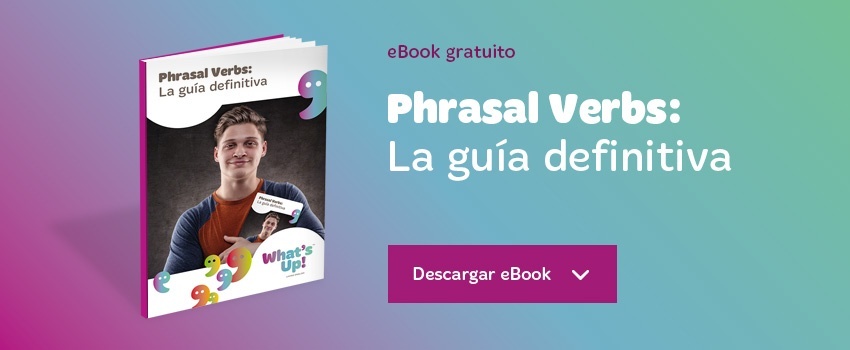What's Up! blog
el mejor contenido del mejor curso de inglés
«Will» y «going to»: aprende a distinguirlos con ejercicios
A diferencia de otros elementos como la pronunciación o el vocabulario, los tiempos verbales en inglés son relativamente sencillos. Las únicas conjugaciones que suponen una dificultad considerable son el pasado y participio en verbos irregulares, pero por lo demás las estructuras se aprenden con mucha facilidad. El problema viene a la hora de saber cuál usar en cada caso, ya que algunas distinciones son muy sutiles. Esto ocurre, por ejemplo, con las distintas maneras de formar el futuro. ¡Con ejercicios will y going to lo verás más claro!
El futuro con will y going to
Como ya hemos contado en el blog, hay varias formas de hablar de hechos que ocurrirán en el futuro. Estas son las principales:
- «Will»: I will finish this at some point.
- «Going to»: I am going to make dinner for them.
- Presente continuo: I am travelling to India for a meeting tomorrow.
- Presente simple: Classes start at 8:00.
Hoy nos vamos a centrar en las diferencias entre las dos primeras. Si lo necesitas, repásate las estructuras antes de seguir leyendo. Así te irás preparando mejor para los ejercicios con will y going to.
Si te fijas, el uso del futuro con will y going to se resume a nuestra necesidad de hablar de:
- Predicciones o sucesos que creemos que pasarán.
- Decisiones que tomamos sobre la marcha.
- Acontecimientos que sabemos con certeza que se producirán.
¿Cuándo usar «Will» y «going to»?
Muchas veces, la elección de una palabra u otra depende del matiz que queramos darle, por lo que en una misma frase pueden ser correctas ambas, solo que con significados diferentes. Mientras que «will» expresa certeza o convicción fuerte de que algo va a ocurrir, «going to» expresa intención o planes, aunque también puede utilizarse para predecir eventos basándonos en indicios que podemos percibir. «Going to» es especialmente común en contextos informales.
Otros usos de will
Hay otros contextos en los que solo puede utilizarse «will»:
- Predicciones basadas en algo que no estamos percibiendo en el momento.
- Primer condicional.
- Decisiones tomadas en el momento.
- Demostrar disposición a hacer algo u ofrecer ayuda.
Pero la mejor forma de aprender a usar cada forma donde corresponde es ponerlo en práctica. Repásate lo que necesites y prueba a hacer estos ejercicios. Tienes las respuestas al final. Recuerda que, en los casos en los que haya más de una opción válida, el significado cambiará según la estructura que elijas. Good luck!
Ejemplos de will y going to
- I’m going to work tomorrow – Voy a trabajar mañana. (un plan que se cumplirá)
- Is Elisa finally going to visit her mother next week? – ¿Elisa va a visitar finalmente a su madre la semana que viene? (se pregunta acerca de un plan)
- Tim will be 21 next summer – Tim cumplirá 21 el próximo verano. (ocurrirá con total seguridad)
- Please, I will have a soda. – Por favor, tomaré una soda (desición del momento)
Ejercicios will y going to
- I think we should stay at home. Look at those clouds, it ___________________ (rain).
- Can’t you open the jar? Don’t worry, I ___________________ (open) it for you.
- I ___________________ (take) my children to the theme park soon.
- We ___________________ (not be) in time for the show if we don’t hurry! It’s almost eight now!
- There seems to be a traffic jam further up that road, se we _________________ (take) the other one.
- The cat has been acting weird for a few days so I ___________________ (take) it to the vet.
- She has bought some comic books for my brother. I’m sure he ______________ (like) them.
- I ______________________ (not clean) up your mess again.
- Watch out! You ___________________ (fall) into that hole.
- This year I ___________________ (win) the lottery for sure, I have a hunch.
Respuestas
- I think we should stay at home. Look at those clouds, it is going to rain.
- You can’t open the jar? Don’t worry, I’ll open it for you.
- I’m going to take / will take my children to the theme park soon.
- We won’t be in time for the show if we don’t hurry! It’s almost eight now!
- There seems to be a traffic jam further up that road, so we‘ll take / are going to take the other one.
- The cat has been acting weird for a few days so I‘m going to take it to the vet.
- She has bought some comic books for my brother. I’m sure he’ll like them.
- I‘m not going to clean / won’t clean up your mess again.
- Watch out! You’re going to fall /’ll fall into that hole.
- This year I’ll win the lottery for sure, I have a hunch.
Posts relacionados:



